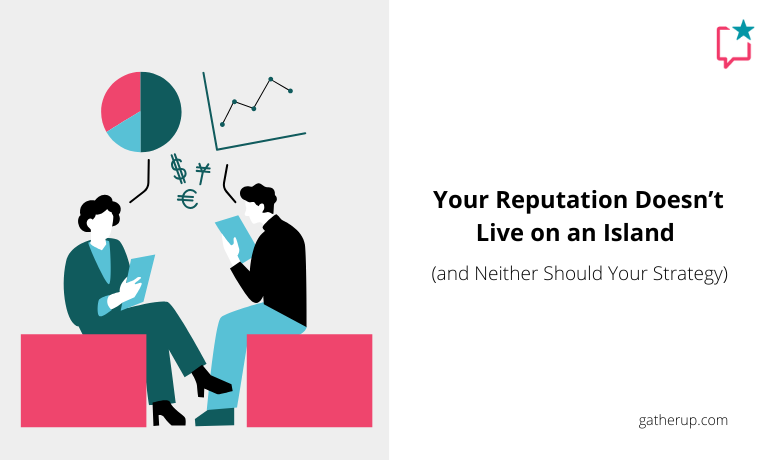
Is 4.5 stars good?
I mean… maybe? Depends who you’re standing next to.
If your competitors are limping along at 4.1, then congrats, you’re the shining star of the bunch. But if they’re sitting pretty at 4.7? Your 4.5 suddenly looks a little, well… average.
That’s the thing about online reputation: it doesn’t live in a vacuum. It lives in a neighborhood. It lives in a crowded, noisy marketplace where consumers are comparing your ratings against everyone else on the block (and across town). Your stars don’t exist on an island. They exist in context.
So the real question isn’t “Is my rating good?”
It’s “Is my rating good enough?”
The Danger of “Good Enough” Thinking (Now With Some Hard Truths)
Here’s where a lot of businesses trip up. They treat their star rating like a trophy on a shelf instead of what it really is: a living, breathing reflection of their customer experience. But consumer expectations aren’t static. And more importantly, your competitors aren’t standing still.
In fact, per our research:
- 99% of consumers read reviews before engaging with business that is new to them
- 73% of people won’t even consider a business with fewer than 4 stars
But again, stars aren’t absolute. They’re relative. And the bar for “good” shifts depending on your space.
Take a look at the 2024 industry averages from our latest Online Review & Reputation Benchmark Report:
- Healthcare: 4.6 stars
- Insurance: 4.5 stars
- Restaurants: 4.3 stars
- Legal & Law: 4.7 stars
- Storage & Transportation: 4.2 stars
- Construction: 4.7 stars
So, is your 4.5-star rating strong? In insurance, sure, you’re right on track. But in legal services or construction? You’re already behind.
This is why “good enough” is such a dangerous mindset. Your reputation isn’t a fixed asset. It’s a moving target. And the closer your competitors are to five stars, the harder it is for that 4.3 or 4.5 to keep pulling its weight.
Cue the Dark Side: The Urge to Game the System

When the pressure to keep up gets real, some businesses are tempted to, shall we say… bend the rules.
Buy some reviews. Incentivize customers off the books. Try to sneak in some glowing self-written love notes.
Spoiler: it never ends well.
Google is deleting millions of fake reviews every single year to keep the playing field clean. The FTC has officially made it illegal to post fake reviews or pay for endorsements without clear disclosure.
Even if you dodge enforcement for a while, your customers can feel the inauthenticity. And nothing kills trust faster than the whiff of desperation.
Fake Reviews Will Get Your Business Ignored
Let’s be real: consumers are smart.
- 60% say they don’t trust reviews that feel AI-generated or spammy.
- The majority would rather believe one honest, imperfect review over a sea of suspiciously perfect ones.
- And bad online buzz has a nasty habit of leaking into the real world—group chats, dinner table rants, next-door neighbor warnings.
So even if you manage to inflate your numbers for a hot second, you’re still losing the one thing that actually matters: credibility.
The Reputation Triple Threat: Build. Manage. DEFEND.
Here’s the thing no one tells you: reputation management isn’t just about getting more reviews.
It’s about earning them.
It’s about managing them well.
And most importantly? It’s about defending them.
Because the real challenge isn’t collecting stars. It’s holding the line.
That’s where GatherUp comes in. We’re not just here to help you build your reputation. We’re here to help you manage it, defend it, and protect your spot at the top of the map pack. And we’re the only platform that can truly deliver on all three.

- Proactively request reviews (multi-channel, fully compliant).
- Monitor and respond across both first-party and third-party channels.
- Fight back against fake reviews, spam, and shady competitors without losing your cool (or your rankings).
Compliance? Check. Transparency? Built in. Automation? Yep—but with the human touch your customers actually respond to.
While other platforms might help you collect a few stars, we help you hold the line.
Your Reputation is a Relationship (and a Battle Plan)
Here’s your gentle reminder (or not-so-gentle, depending on how much coffee we’ve had): your star rating isn’t the goal. It’s a signal. And your reputation? It’s not just how you look online—it’s how people feel about you before they even walk through the door.
So stop chasing numbers. Start building real trust.
Because your reputation doesn’t live on an island.
But with the right strategy? It absolutely rules the map.
Ready to build, manage, and defend your reputation like a pro?
Book a demo with GatherUp →
